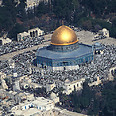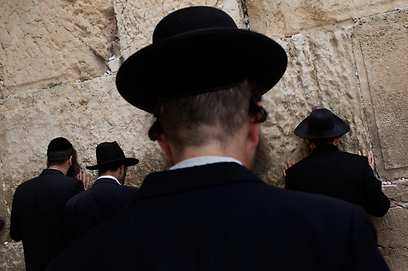
Poll: Israel's Jews abandoning Temple
Survey conducted ahead of Tisha B'Av shows 66% of Israeli public see Western Wall as Jewish people's holiest site, while only 29% give title to Temple Mount. About half of public believes Mount is under Waqf's sovereignty, nearly 60% want site divided between Jews and Muslims
The survey included 523 respondents – a representative sample of the adult Jewish population in Israel. The maximum sampling error was 4.5%.

Western Wall is most sacred place for Jewish people, 66% say (Photo: AP)
Although the Western Wall draws its sacredness from the Temple Mount, 66% of respondents said it was the holiest place in the Land of Israel, while only 29% favored the Temple's location itself. Two percent mentioned the Cave of the Patriarchs in Hebron, another 2% chose the tomb of Rabbi Shimon bar Yochai in Meron, and 1% - Rachel's Tomb in Bethlehem.
A breakdown of the responses according to religious affiliation reveals that the secular and traditional public sees the Western Wall as the holiest site (67%), while the national-religious and ultra-Orthodox chose the Temple Mount (49-54%).
Secular and traditional Jews, by the way, visit the Western Wall once every few years (44%) while religious and haredi Jews arrive at the site several times a year (53-54%).
55% interested in visiting Temple Mount
As opposed to the Western Wall, there appears to be an inverse proportion between the affinity to the Temple Mount and respondents' level of religiousness: The higher their conservatism – the more distant they feel from the Temple site. This stems from the halachic prohibition to get too close to holiness, which deters them from going up to the Mount.
Forty-nine percent of respondents believe it is important for Jews to visit the Temple Mount (including 45% of secular-traditional Jews and 78% of national-religious Jews), but 40% view it as unimportant (65% of haredim and those defined in the survey as "hardalim" – religious Zionist Jews inclines significantly toward haredi ideology). Among those in favor, 57% said it should only be done according to the rules of Halacha.
The survey participants were asked, "Will you be interested in visiting the Temple Mount as part of a tour of Jerusalem?" Fifty-five percent said yes (60% of secular-traditional Jews and 68% of national-religious Jews), and 38% said no (75% of haredim-hardalim). Yet 58% would not say a prayer even if it were possible (61% of secular-traditional and 70% of haredim-hardalim), and 34% would pray (including 73% of national-religious Jews).
About 50%: Muslim Waqf controls Mount
What about the establishment of a prayer house (or actual synagogue) on the Mount? Forty-nine percent are against the idea (47% of secular-traditional Jews and 85% of haredim), and 30% are in favor (52% of national-religious).
"May the Temple be built soon in our lifetime?" Only 30% are in favor of rebuilding the Temple today (43% of national-religious), while 45% are against it (45% of secular-traditional Jews and 62% of haredim).
Forty-nine percent of the public believes the Temple Mount is under the sovereignty of the Muslim Waqf, and only 19% think the State of Israel controls the site (others mentioned Jordan and the Palestinian Authority as well). Among those who claim there is no Israeli sovereignty, 47% said the State must take control of the holy site and 11% would put it in the hands of a Jewish religious authority.
59%: Divide Mount between Jews, Muslims
According to 48% of respondents (58% who had an opinion), the State must guarantee freedom of access and ritual on the Temple Mount for Jews as well, as required by the Protection of Holy Places Law (48% of secular-traditional Jews and 70% of national-religious Jews believe so). On the other hand, 35% agree with the ban on Jewish prayer on the Temple Mount (52% of haredim-hardalim).
Forty percent said that by allowing the current situation, in which there is no freedom of religion for Jews, the police were surrendering to violence and threats on the part of Muslims (64% of national-religious, 54% of haredim-hardalim and 34% of secular-traditional Jews said so), while 36% believe that the law enforcement authorities are simply maintaining law and order (39% of secular-traditional Jews).
So what is the solution? Fifty-nine percent are in favor of an arrangement dividing the Temple Mount between Jews and Muslims according to defined areas and times, as is the custom at the Cave of the Patriarchs (60% of secular-traditional, 65% of national-religious and 46% of haredim-hardalim). Twenty-three percent are against this proposal.















